Feature
Shaping the future of UK medtech
The landscape of the medical technology industry in the UK is expected to grow following a publication of a policy paper by the British government. But what is the plan and how will medtech firms react to proposed initiatives? By Kiays Khalil.

Mark Oakes, Head of Life Sciences Exports and National Security Lead at the Department for International Trade. Credit: Kiays Khalil
The UK is showing potential to be a leading example of a nation who puts innovation of medtech first, creating jobs and international trade.
With the National Health Service (NHS) calling for innovation in the space, a pool of homegrown talent and government policies focusing on the ‘right products at the right price,’ the future of medtech in the UK is bright.
The Covid-19 pandemic accelerated innovation in the industry with an increased demand for wearable devices, telemedicine, and integrated artificial intelligence (AI) in medical devices. This year the AI market is predicted to reach sales of $93 billion up 12% from 2022 and in 2019, the wearable device market was worth nearly $27 billion and is expected to grow to $64 billion by 2024. While the telehealth market size was valued at $2.17 billion in 2022.
Mark Oakes, Head of Life Sciences Exports and National Security Lead at the Department for International Trade (DIT) recently addressed the future of UK medtech at the industry event, MedTech Expo 2023 in Birmingham, UK. In his speech, Oakes emphasised the innovation and strength of the UK’s medtech and life sciences sector.
“It’s really impressive to see the innovation and the strength of the UK’s medtech and life sciences sector,” said Oakes. “The industry has also had to withstand the supply chain challenges, inflationary pressures of the last year, which have all added to the business difficulties. These are real challenges that companies are having to navigate and they are not easy to overcome.”
A Promising Outlook:
Despite the challenges, the global market is growing rapidly. According to Oakes, by 2026 medtech revenue is projected to reach $644 billion, presenting significant opportunities for the industry. The UK has earned a global reputation for driving innovation, with over £6.4 billion in exports. Post-Covid, the sector witnessed an increased demand for improved diagnostics, remote patient monitoring, and digital technology in healthcare.
In June 2023 the Health and Social Care Secretary, Steve Barclay announced a £21 million fund for AI technology to diagnose and treat patients quicker.
“Artificial intelligence is already transforming the way we deliver healthcare and AI tools are already making a significant impact across the NHS in diagnosing conditions earlier,” said Barclay. “I’m focused on adopting the latest cutting-edge technology across our health and care system to ensure we can continue to deliver the best care for our patients and cut waiting times, which is one of the government’s five priorities.”
NHS Trusts will be able to apply for an AI Diagnostic Fund to accelerate the distribution of AI imaging and decision support tools diagnosing conditions such as cancers, strokes, and heart conditions. Currently the NHS spends £10 billion a year on medical equipment.
Government support and investment:
The DIT has positioned itself to play a crucial role in supporting medical technology companies. The Department of Business and Trade (DBT) which was established in February 2023 combines the DIT and business support elements of the Department of Business, Energy, and Industrial Strategy. In turn, this allows the UK government to offer end-to-end assistance to the medtech sector including domestic support and international trade.

MedTech Expo 2023 Birmingham conference floor. Credit: Kiays Khalil
I believe personalisation is the future of medicine as we all are different, and we need different treatments or individual adjustments. We still know very little about our bodies, but it seems that personalisation is one of the keys to more effective treatment.
Psylink CEO Laura Korsakova told Medical Device Network.
Addressing the crowd at the MedTech Expo, Oakes explained how the government will support the industry. “Our main objective is to help UK businesses succeed globally by fostering export opportunities, attracting foreign investment, and securing trade deals,” said Oakes. “We work to support UK companies looking to expand into international markets, offering expertise in market research, export strategy development, and navigating trade barriers. We collaborate with foreign governments and international organisations to note negotiate trade agreements that benefit UK businesses.”
An example of this support is already happening across the pond in the US. The UK government has begun forming memorandum of understanding (MOU) agreements on a state-by-state basis. According to Oakes, US states such as Florida have a very strong interest in the life science sector, so establishing these sub national relationships can be beneficial for the UK medtech industry who can target these large and focused economies.
The UK government has also shown its commitment to the sector through strategies and investment packages. The Department of Health and Social Care (DHSC) published its inaugural medtech strategy, outlining the direction and long-term support for the sector. On top of this, a £650 million investment package was revealed which will be used to address key issues impacting the industry. These funding initiatives aim to accelerate clinical trials, improve innovation pathways, and streamline market access, benefiting medtech companies.
Showcasing UK medtech excellence
The DIT is actively promoting the UK MedTech excellence on the international stage. With initiatives such as showcases, competitions, and trade shows providing opportunities for companies to demonstrate their innovations and connect with potential investors and partners.
According to Oakes the DIT will be taking a delegation of UK medical technology businesses to the Kingdom of Saudi Arabia with the purpose of networking with key decision makers in the region. Oakes hopes this opportunity will open to the door for the visiting firms to negotiate potential export prospects and secure possible investments. They will also be attending MEDICA 2023 in Dusseldorf, Germany later in year.
These trips will not only be used to support exports of UK medtech but will also aim to attract inward investment fostering growth for UK companies, especially smaller businesses.

Mark Oakes addressing the crowd at the MedTech Expo 2023 in Birmingham. Credit: Kiays Khalil
One of the DIT’s most successful export promotion programs is its annual delegations to the Texas Medical Centre. Working with UK Research and Innovation (UKRI) as part of the BioBridge agreement, and in partnership with the Texas Medical Centre, the DIT takes applicants from small and medium-sized enterprises (SME).
“Our five-year partnership has already seen dozens of companies visit Texas and secured over £100 million in export wins,” said Oakes. “It really does work. It’s a great partnership and I’m keen to develop more of those targeted interventions where we can both support investment and explore the critical markets.”
Overcoming challenges:
The path to success for medical technology business includes many obstacles. Reimbursement and regulation remain significant hurdles for companies. However, the UK government has launched initiatives like the Innovation and Devices Access Pathway, designed to streamline the process of introducing new medical technologies into the NHS. Collaborations between Nice, MHRA, Health Technology Wales, and the Scottish Health Technology Group aim to facilitate market access for innovative medical technologies.
Oakes claimed the UK should have confidence in the medtech sector which provides close to 300,000 jobs and accumulates billions in exports. “UK innovations continue to save lives around the world, and this is something companies can be rightly proud of,” said Oakes. “The UK’s medtech sector is not just changing lives; it’s transforming the future of healthcare and its impact resonates globally.”